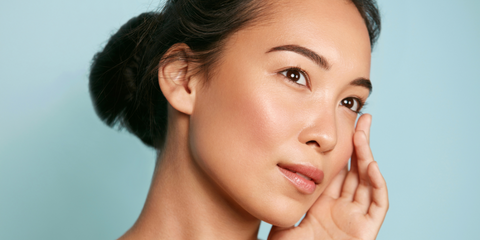The skin's protective barrier plays a crucial role in the health of the skin. It acts as a barrier against harmful environmental factors and helps maintain the skin's moisture balance. When the protective barrier is damaged, it can lead to many skin problems and imbalances. In this article, we review the importance of the skin's protective barrier, symptoms of damage and treatment options.
What is a damaged skin barrier?
The skin's protective barrier consists of fats, such as lipids and ceramides, as well as moisturizing components such as hyaluronic acid. This combination forms the skin's outermost layer and helps retain moisture, protecting the skin from external stress.
Damage to the skin barrier can be caused by several factors, such as:
-
Excessive cleaning: Washing the skin too often or using too strong cleansing products can remove the skin's natural oils and weaken the protective barrier.
-
Excessive exfoliation: Although exfoliation is important for all skin types, too frequent use of harsh products can damage the skin barrier.
-
Dryness: Climatic conditions, such as cold or dry air, can dry out the skin and damage the protective barrier.
-
UV radiation: Excessive exposure to UV rays can damage the skin's barrier and lead to premature aging.
-
Chemical substances: Some chemicals and active ingredients can irritate the skin and weaken the protective barrier.

Symptoms of a damaged skin barrier
A damaged skin barrier can manifest itself in several ways, including:
-
Dryness: Reduced moisture level is one of the first signs of a damaged barrier.
-
Eczema and rashes: A weakened barrier can make the skin more susceptible to inflammation and skin conditions.
-
Irritation and redness: The skin's imbalance can result in increased sensitivity.
-
Sensitivity: Damage to the protective barrier can make the skin more sensitive to external factors, including cosmetics.
-
Itching: Dryness and irritation can lead to itching, which is often a sign of imbalance.
Treatment of a damaged skin barrier
Fortunately, there are several ways to care for and strengthen the skin's protective barrier:
-
Moisturizing creams: Use moisturizing products that restore the skin's moisture balance.
-
Gentle cleaning: Avoid strong cleansers and choose mild formulations instead.
-
Sun protection: Use sunscreen daily to protect the skin from UV damage.
-
Cost: A balanced diet rich in antioxidants and healthy fats can support skin health.
-
Avoid irritants: Reduce the use of strong exfoliating products.
The best ingredients and products for a damaged skin barrier
Ceramider: Strengthens the skin barrier and prevents moisture loss.
Pantenol (B5-vitamin): Soothes irritation and moisturizes the skin.
Hyaluronic acid: Deeply moisturizes and strengthens the skin barrier.
Niacinamid: Reduces inflammation and improves the function of the skin barrier.
Aloe vera: Soothes irritation and promotes healing.
Antioxidants (vitamins C and E): Protects the skin against free radicals.
These ingredients can help improve the health of the skin barrier and contribute to the overall well-being of the skin. However, remember that each skin type is unique and may have specific needs.
The skin's protective barrier is a key component of healthy skin. Its damage can lead to symptoms such as dryness, irritation and sensitivity. Fortunately, there are many ways to care for and rebuild the barrier to maintain healthy and balanced skin.
Our skincare experts can provide advice on suitable products for sensitive skin. However, if you have persistent skin issues, it is recommended that you contact a dermatologist for further guidance and treatment.




 info@yepposoonsoo.se
info@yepposoonsoo.se
 14 dagar returrätt
14 dagar returrätt
 PCI-DSS Compliant
PCI-DSS Compliant
 PayPal Buyer Protection
PayPal Buyer Protection
 Klarna – Pay Securely
Klarna – Pay Securely